Marketing agencies have a lot to manage.
First, there’s prospecting, onboarding, and managing multiple clients. Then there’s internal communication, collaboration, and project management. Oh and don’t forget the actual work itself — everything from SEO and analytics to content creation and social media management.
So how do you stay on top of everything and make sure your marketing agency runs like a well-oiled machine? The answer, of course, is the right marketing agency software.
In this article, we’ll explain:
- What marketing agency software is — and why you need it
- The best tools for building a winning marketing tech stack
Ready? Let’s dive in.

What is marketing agency software?
Marketing agency software streamlines, automates, or enhances the way marketing teams operate. It encompasses a whole range of tools, including:
- Project management software
- Team collaboration tools
- Social media management platforms
- Customer relationship management tools
- Workflow automation tools
Without these tools, it’s pretty much impossible for marketing agencies to be competitive in 2024. Unsurprisingly, countless new marketing tools have hit the market in recent years. And while choice is good, it can also be overwhelming. That’s why we’ve written this article.
Related: Marketing client questionnaire: 30 questions to ask
Read on to learn about seven of the best marketing agency software options. We’ll also provide some alternatives to each tool, to give you a broader idea of what’s available. Enjoy!
The best marketing agency software for 2024
1. HubSpot Marketing Hub: Best campaign management software
Marketing isn’t just about creating crisp copy or eye-catching social campaigns. It’s a highly commercial function too. That’s why your marketing agency needs a dedicated tool to manage campaigns, measure their effectiveness, and engage customers.
As the name suggests, Hubspot’s Marketing Hub acts as a central platform for all your marketing processes and data. It offers powerful features that help you design, deliver, and track marketing campaigns. It’s also part of Hubspot’s wider CRM platform. When combined, you can align all your marketing and sales data and goals.
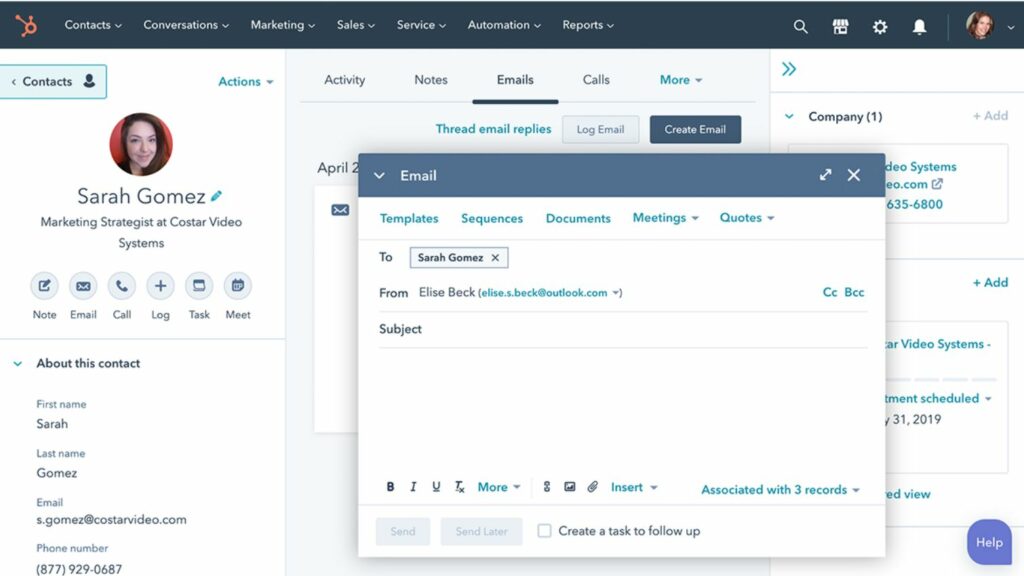
Key features include:
- Publish and track blog, social, or video campaigns with ease
- Improve your search authority with a range of SEO tools
- Chatbots to connect with and convert leads as they visit your website
- A range of social media management tools to drive engagement
- Ad tracking and management to guarantee maximum ROI
Hubspot offers a free version of their marketing tool, covering the basics you need to manage campaigns. But to get features like SEO, marketing automation, social media management, and predictive lead scoring, you’ll need to upgrade to a paid plan.
Honourable mentions:
- Mailchimp: A great tool for automating email campaigns and growing your business
- Drip: An email marketing automation tool that focuses on growing eCommerce brands
- Marketo: Great for building and automating end-to-end marketing campaigns
2. Asana: Best project management software
No market agency tech stack is complete without project management software. These tools help your entire team stay aligned on what needs doing, when, and by whom. This is particularly important for marketing projects, which involve a lot of moving parts.
Asana is a task management tool with the perfect balance of simplicity and effectiveness. Its simple UX makes it easy for marketing agencies to pick up and use with minimal training. Once up and running, it offers a range of project management features that allow you to connect tasks to people, projects, and goals.
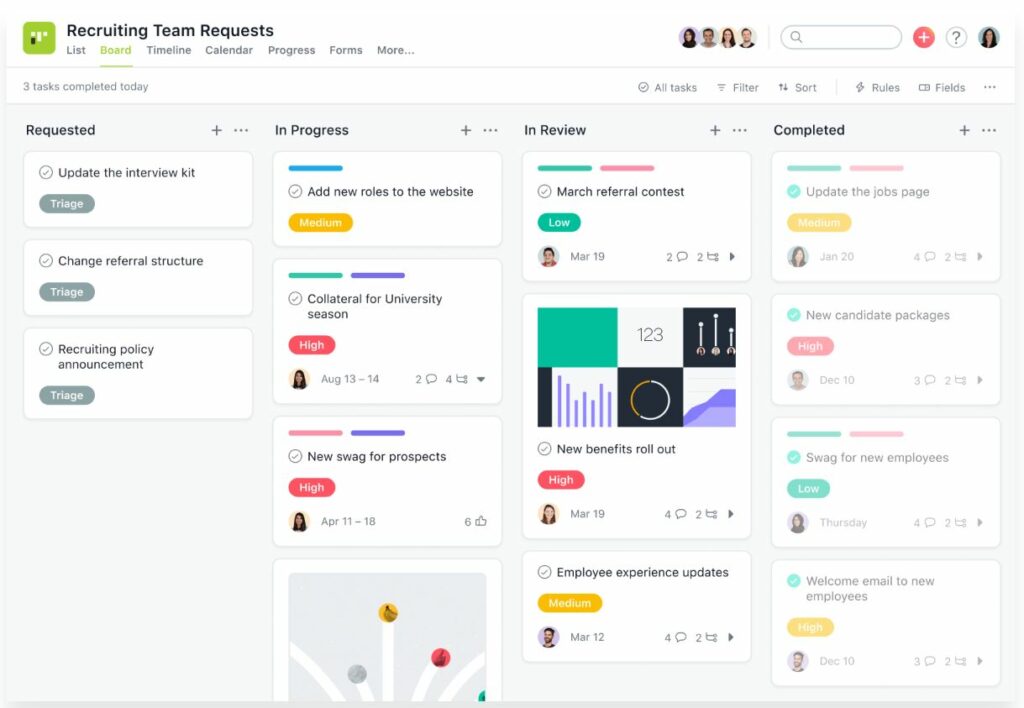
Key features include:
- Kanban boards for seeing what needs doing, what’s in progress, and what’s done
- A visual workflow builder that allows you to coordinate task management across teams
- Gantt charts and timelines show how different project elements fit together
- Create simple forms for managing work requests and client intake
- Calendars show a top-down view of all tasks and deadlines
Asana offers a pretty decent free version, covering all the essentials you need to manage projects and tasks. But you’ll need to upgrade to one of their paid plans for more advanced functionality. This includes workflow automation, advanced reporting, and resource planning and management.
Honourable mentions:
- Monday.com: A project-management, sales, and CRM tool in one
- Airtable: Like a spreadsheet on steroids, Airtable is a great tool for staying organised
- Notion: A great tool for managing tasks, documenting internal processes, and taking notes
3. Surfer: Best for search engine optimization
Creating amazing content is one thing. Getting it seen is another. With the right SEO tool, you’ll have everything you need to get your content marketing campaigns in front of as many eyes as possible.
Surfer offers a range of powerful features that maximise the power of your content — from strategy and creation to optimisation. Among strong competition, it’s one of the most highly-rated SEO tools by customers. That tells you everything you need to know.
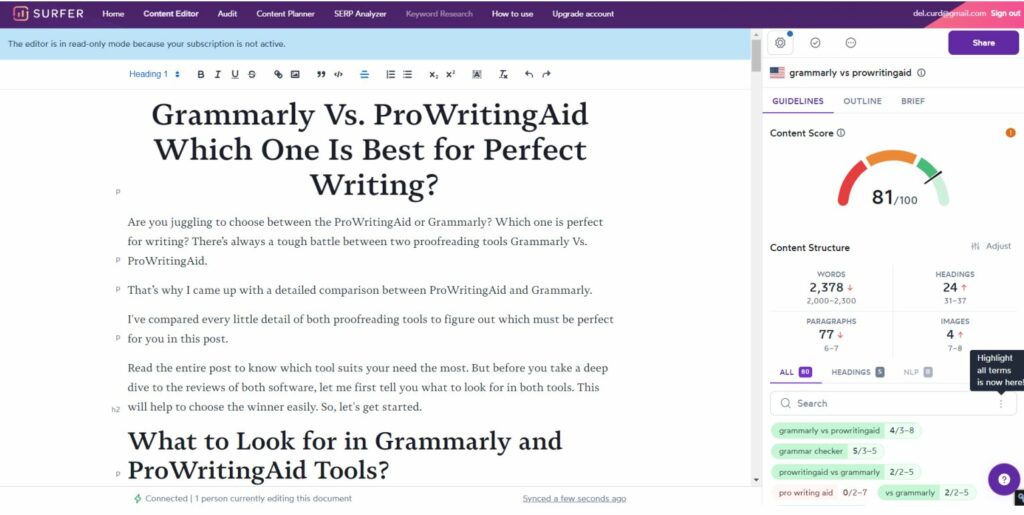
Key features include:
- Keyword Research Tool that allows you to discover relevant topics, understand search intent, and create highly relevant content
- Content Editor that guides you through the process of producing high-ranking content
- Generate content briefs with a single click
- Powerful integrations with WordPress, Google docs, Jasper, and more
- Plagiarism tool automatically spots inauthentic content
There’s no free version of Surfer, but you can sign up for a free trial. If you like what you see, there are a range of paid plans to suit your needs. The more you pay, the more articles you can write and optimise in Surfer’s Content Editor.
Honourable mentions:
- SEMRush: One of the most popular platforms for SEO, PPC, and competitor research
- Moz Pro: A complete SEO tool, covering keywords, link building, website auditing, and more
- HubSpot Marketing Hub: An all-in-one marketing toolkit with strong SEO capabilities
4. Hootsuite: Best social media management platform
With so many competing platforms and a hell of a lot of noise, social media can sometimes seem like an untamable beast. But with the right tool, you can stand out from the crowd and connect with people where they spend most of their time.
Hootsuite offers a complete solution to all your business’s social media needs. You can create and manage posts, schedule them across multiple social media platforms, and dive deep into the data to track success.
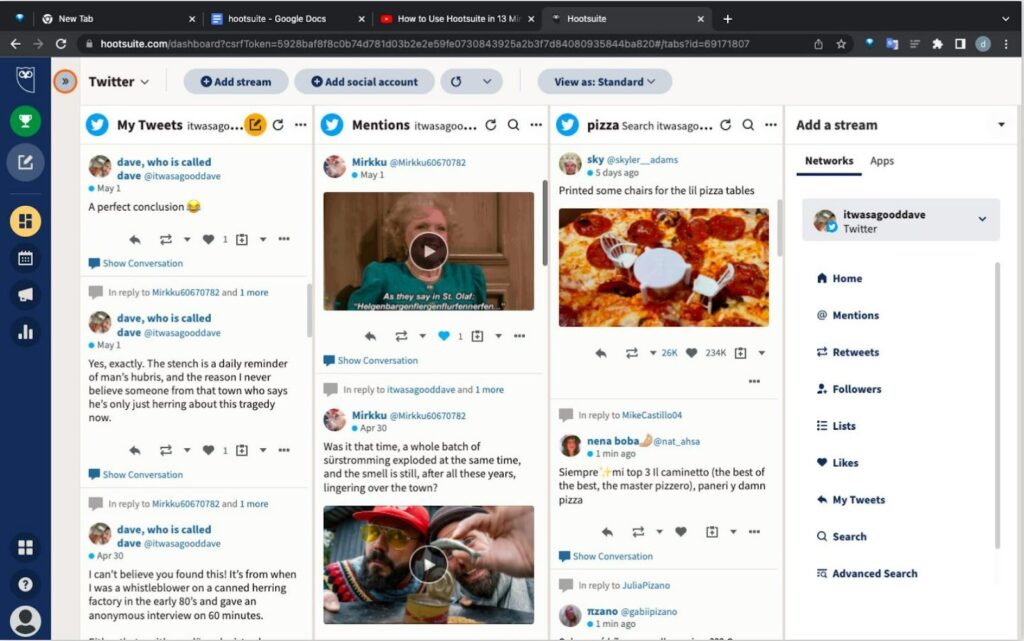
Key features include:
- Schedule, publish, and track the effectiveness of social posts across all major channels
- Calendar view allows you to see and manage all published and upcoming posts in one place
- Social streams allow you to monitor hot topics and trends — and see what the competition is up to
- Understand the optimum times to publish your posts for maximum reach
- Detailed analytics sheds light on your social engagement and audience
Hootsuite offers several pricing options, with an increasing number of users, social accounts, and features available with each tier. There’s a free 30-day trial where you can get your feet wet, but if you skip the trial and dive straight in, you’ll get 20% off the price.
Honourable mentions:
- Buffer: A popular tool for social scheduling, ideal for those who want a more straightforward option
- Sprout Social: With the ability to manage an unlimited number of clients, this is a great choice for larger agencies
- SocialPilot: A cracking social media tool for smaller teams, with a very attractive price point
5. Slack: Best for team collaboration and communication
In the world of remote work, marketing agencies need an effective way to communicate, share ideas, and stay in the loop. And no, I’m not talking about email. The right collaboration tool is a central hub where team collaboration can happen seamlessly, in real time.
Although Microsoft Teams has stolen some of its thunder in recent years, Slack remains a top choice for most businesses. It offers intuitive UX, an incredible range of integrations, and powerful automation options.
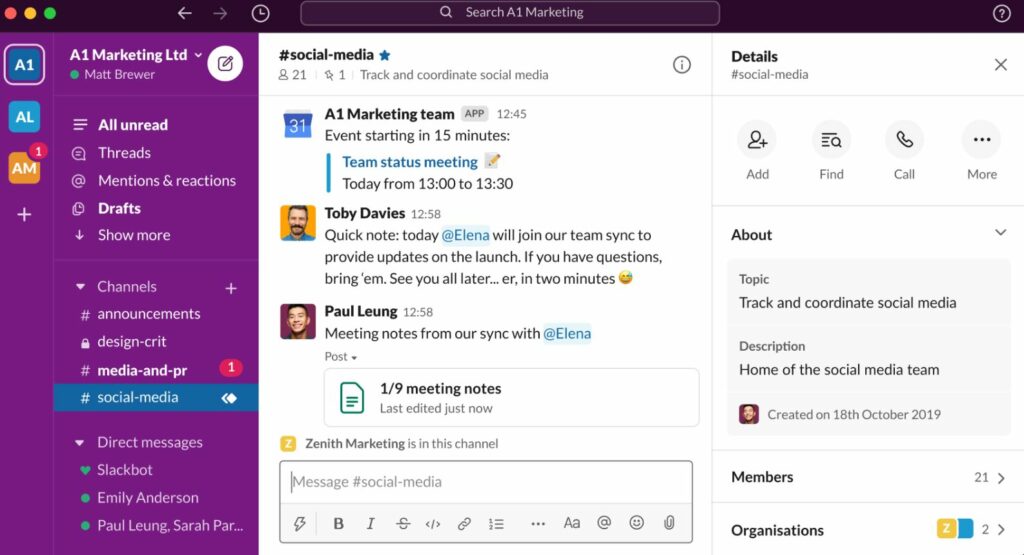
Key features include:
- Slack App Directory, with over 2400 ready-to-use integrations
- Automate processes and boost productivity with Slack Bots
- Threaded conversations allow you to discuss topics in a more organised way
- Voice and video call options for more personal communications
- Advanced search options allow you to find old conversations easily
Honourable mentions:
- Microsoft Teams: Slack’s great competitor is a solid choice, especially if you work in a Windows environment
- Loom: Create and share asynchronous videos to explain complicated processes
- Zoom: Because face-to-face communication will always be important
6. Google Analytics: Best analytics tool
To manage their clients effectively, marketing agencies need a clear picture of what’s working, what isn’t, and why. This is why analytics tools are essential. They help you to see under the hood of campaigns, track the success of your marketing efforts, and understand user behaviour.
Google Analytics has been the market leader for as long as anyone can remember — and for good reason. Built by the company behind the most popular search engine, it offers unparalleled insights into customer sentiment, trends, and website performance.
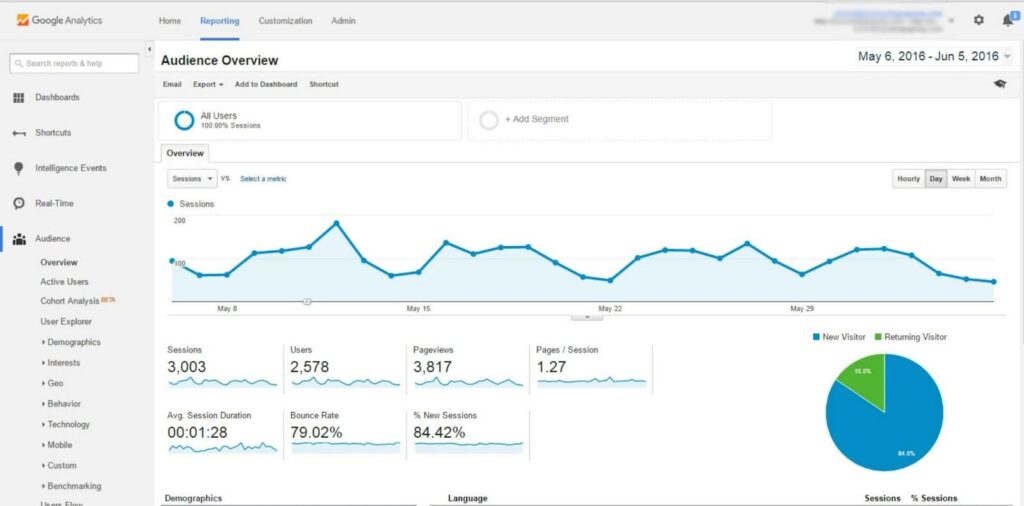
Key features include:
- Intuitive dashboards, custom reports, and powerful visualisations
- Deep insights into advertising, audience, conversion, user behaviour, and more
- Funnel analysis allows you to track the user journey in detail
- Tag Manager makes it simple to deploy marketing tags without having to mess with the code
- Smart Goals help you track progress towards your desired outcomes
Another plus for Google Analytics is its free version, which should pack more than enough features for most small-to-medium-sized businesses. There is a paid version for enterprises that offers even more extensive functionality, but it comes at a hefty price.
Honourable mentions:
- AgencyAnalytics: This solid analytics tool is designed specifically for marketing agencies
- Adobe Analytics: A popular Google Analytics alternative aimed at large enterprises
- Supermetrics: A tool that gathers and combines marketing data from multiple sources
7. Content Snare: Best tool for gathering client information
Whether it’s onboarding new clients or processing requests, marketing agencies have to gather a lot of information. Without a dedicated tool for this, you’re relying on clunky, outdated systems like email, shared docs, and spreadsheets. Things can quickly get messy.
Content Snare helps you manage the entire process of gathering information — from form-building to requests and approvals. All the information you need is there in one easy-to-manage place, saving you precious time.
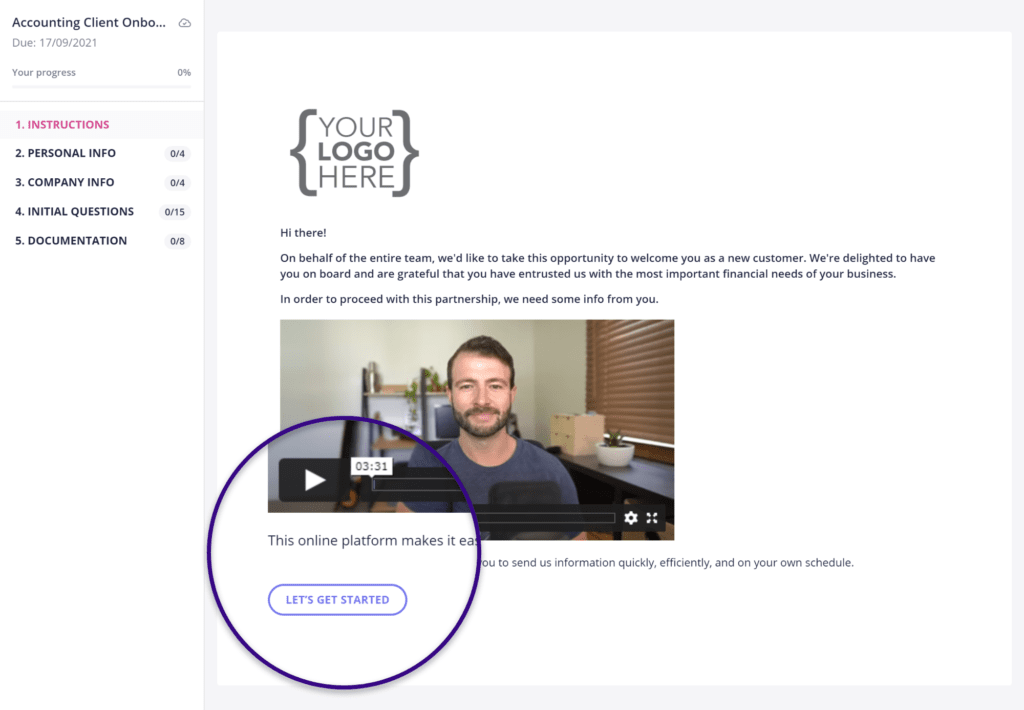
Key features include:
- Create custom-branded forms — or choose a ready-made template from our library
- Request a range of documents, content, and information — and approve or reject with a single click
- Automated reminders to chase customers for missing information
- Answer customer questions directly in Content Snare, without having to resort to email
- Autosave allows customers to pick up where they started at any point
- Automated workflows with our Zapier integration
We offer a free 14-day trial and four different pricing plans. While our basic plan has everything you need to get started, you get more active requests, users, storage, and features with each step up.
Honourable mentions:
- Google Forms: This free form builder is a decent tool for capturing basic information
- Paperform: A good choice for building highly customisable forms and templates
- Microsoft Forms: A simple form builder that integrates seamlessly with Microsoft Excel
Transform the way your marketing agency gathers information with Content Snare
Tired of constantly chasing clients for key details? Fed up with messy email chains and generic tools that don’t really work? Content Snare simplifies the way you gather information, onboard clients, and process requests. Ready to give it a try?

